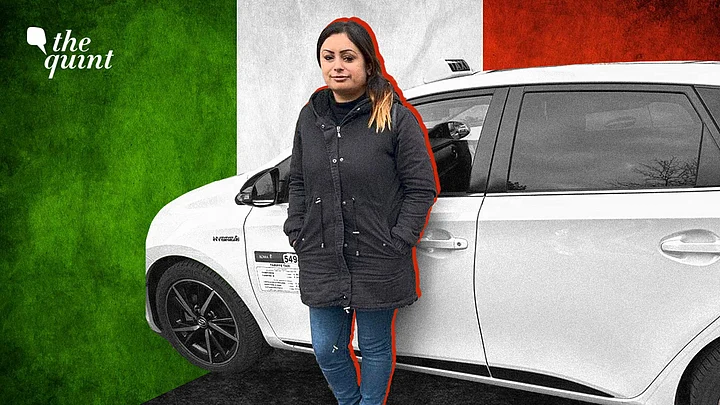What is truly amazing about Manpreet Kaur is that she does not really know how special she is and why her story deserves to be told. Not to advertise herself even though she never wanted to be known as an 'average' girl. But from now on, listening to her story of a little girl coming from a village in Punjab, one would know that this is possible. That she has a chance—to live her life in a different country—the way any other girl does and still be rooted in her heritage and traditions.
Manpreet is the first and only Indian-origin girl to own and drive a taxi in Rome, Italy at less than 30 years of age while being married and having a little child Brian.
Indian by Birth, Italian in Heart
On a sunny, cold morning in Rome, as the cab-service app flashed 'five minutes' to reach and 'Manpreet' as the name of the driver, the passenger happened to be the only journalist in Italy to be able to understand that she is Indian, Sikh, and Punjabi. People, she says, usually don't reckon her as one. And, to be fair, she speaks not only perfect Italian but also with a heavy Roman accent. Italian-Punjabi at its best: friendly, talkative, and smiling. A perfect example of how two cultures can beautifully blend together.
“I was six when I arrived in Italy, and remember very little of my life in India. My father has been living here since the eighties, working first in a stable and then owning a car-washing facility." And there she was, growing up in Rome with quite an open-minded family. She went to high school.“I'm in Italy for almost 25 years and I don't have a single Indian friend except for my relatives: there were no other Indian kids in school. They gave me a new name, Manuela, because nobody could possibly pronounce my name. My family gave me all the possible freedom, but I never took advantage of it.
"I'm still deeply Indian in this aspect: I do have a great deal of respect for my parents and their culture, I never thought to do things that I knew or believed would hurt them or make them angry."
She was 23 when after finishing school and working a couple of years as a hairdresser, marriage came into the picture. “This is the only thing my parents were always adamant about: no way you date or marry an Italian guy, I was supposed to marry only a suitable Indian boy from our community. They raised me up with this as the only limit to my freedom of choice. But when they told me they were going to introduce me to one for real, a boy from a nearby village, I said: no way. I went to India, ready to reject the proposal, but what happened was totally unexpected: the boy arrived, I was peeping from another room via a window. And the moment I saw him, I said "yes, I'll marry him." Just like that. My family was like: are you sure? Why did you change your mind so soon? Don't you want to see some other boy? Nobody is going to force you, you can choose. But I had already made my choice. I fell madly in love, and so did he. We got married in India two years later in a traditional Punjabi wedding. He came to Italy and is now working with my parents in the car-washing place”.
And here comes something else Manpreet never realised, something not easy to swallow even for 'enlightened' western men that she earns much more than her husband and has a far better job.
“He is totally cool with it. He supported me always, and so did my brother. Actually, while I was pregnant with Brian, my brother who's a taxi driver and my father pushed me to clear the driving exams. I was the one sceptical of this job for girls, but then they insisted. After I passed my exams, a licence was available for purchase. I've got a car so I took up this job and now I just love it. It gives me freedom, and also the flexibility to come back when I need to be with my child."
When Brian was born, they moved out of parents' place and into a flat of their own. “This is when I learned cooking and, above all, Indian recipes,” she laughs.
Immigrant Children Do Not Identify With One Culture
Manpreet's relationship with India is quite complex: “To summarise it, I feel too Indian to be completely Italian and, when I'm in India, too Italian to be Indian. I guess it happens to all those like me, children of immigrants born and raised abroad: we are stuck in a kind of nowhereland where we do not truly belong to one culture only”.
Although her Indian family is proud of her, her Italian friends are proud of her, and the few obvious dissenting voices coming from those who think a girl's place is at home are just distant background noise. A land where girls like Manpreet, confident, strong and brave, can take the best of two worlds and make a new world for themselves. And stories that deserve to be told.
(Francesca Marino is a journalist and a South Asia expert who has written ‘Apocalypse Pakistan’ with B Natale. Her latest book is ‘Balochistan — Bruised, Battered and Bloodied’. She tweets @francescam63. This is an opinion piece and the views expressed are the author's own. The Quint neither endorses nor is responsible for his reported views.)
